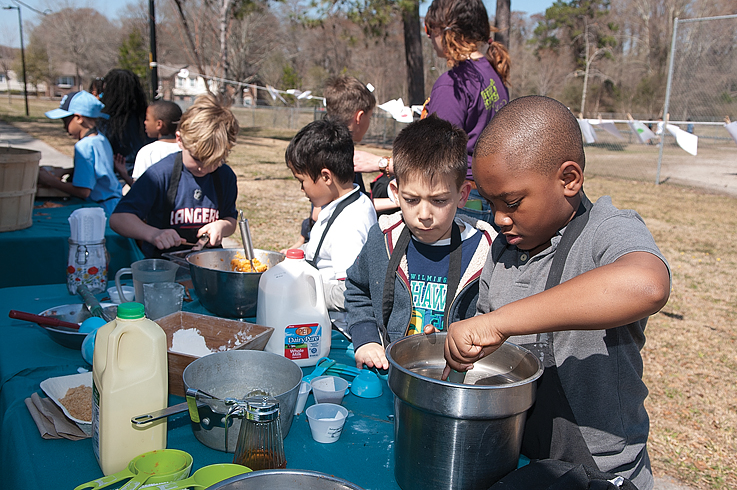By Simon Gonzalez
Staff Writer
Noah was a little suspicious of the menu. Pancakes — made from sweet potatoes? Whipped cream — made from beets?
But the third-grader at Forest Hills Global Elementary in Wilmington has been taught to give all foods a try, so he took a bite. And another, and another. The snack proved to be much better than he expected.
“The sweet potato pancakes are really good, considering they are made from vegetables,” he said. “They tasted really, really sweet and really, really good. The whipped cream looked very delicious, and was very delicious, and very sweet compared to a root.”
The surprisingly good pancake and whipped cream, topped by local honey, was whipped up in the Seahawk Food Wagon, the food truck operated by University of North Carolina Wilmington Campus Dining. The truck made a stop at Forest Hills on Tuesday, March 8 to fix the nutritious snacks for every third-grader, and was scheduled to visit Winter Park Elementary on Thursday, March 10 and Wrightsboro Elementary the following day to prepare pancakes for second-graders.
The food truck visited the schools as part of a partnership between UNCW Campus Dining and FoodCorps, a nationwide program that works with schools to teach healthy eating to young students, many of them at-risk of obesity and diabetes because of poor nutrition.
“A lot of these students don’t have access to fresh fruits and vegetables,” said Jordyn Appel, a FoodCorps service member who teaches at the three schools. “By teaching them and engaging them on how to grow their own food and translating that knowledge to cooking, it’s not only making their lives healthier but helping their parents.”
Some of the sweet potatoes and beets used in the food truck were grown in gardens at the schools planted by Appel and the second- and third-grade students and teachers.
“All of the beets and the sweet potatoes are either from the school garden or they’re from local community farmers in the area,” Appel said. “The honey is local. Everything is sourced locally and it’s natural.”
The students didn’t just get to enjoy the pancakes. They also got to participate in creating them.
“They peeled all the potatoes and smashed the beets,” said Matt Rogers, regional district manager for Aramark, the company that administers UNCW campus dining and the creative force behind the university’s food truck. “They did everything.”
That included measuring the ingredients for the pancake mix.
“This is perfect,” said Hannah Hawkins, a third-grade teacher at Forest Hills. “We just learned about fractions, and they are having to use fractions in the measurements. It integrates math and science and healthy living.”
And they got to go into the truck to help mix up the topping and flip the pancakes on the griddle.
“We’re learning how to operate in a real kitchen,” Appel said. “A lot of them have never used a stove at home before. We’re also just having fun and getting more connected with food and being able to cook it and trying something new they probably wouldn’t ever try before.”
Trying something new is a key part of Appel’s classes.
“FoodCorp’s hashtag is ‘try things,’” Appel said. “Something that’s really great about them is even if they don’t like it, they’ll still try it. If they know going into it, ‘I’m not the biggest fan of beets,’ they’ll still give it a try. It’s a new way of eating it. A lot of them probably didn’t know that you could make whipped cream using beet juice.”
After they tried the food they had the opportunity to rate it. There were charts on the food truck with columns for “I loved it,” “I liked it” and “I tried it.” The students could register their opinions by putting a sticker in the appropriate place. At Forest Hills, the pancakes got an overwhelming “I loved it” response, while the beet whipped topping was drawing almost equal amounts of “loves” and “tried its.”
The rating categories are by design. No negative language is supposed to be heard when talking about food. Students aren’t supposed to declare that something is yucky. “I’m not a fan” or “It’s not for me” are the preferred options.
It’s all part of the effort to help the students to think positively about healthy options, and to keep an open mind that food that is good for them might actually taste good.
“The kids don’t like vegetables that much. They like to eat what they like,” said Forest Hills third-grade teacher Carman Peruyero. “This is a good opportunity for them to try different things. This program shows them how important it is to try a variety of vegetables and fruit. They try it, and they say it’s not too bad.”




